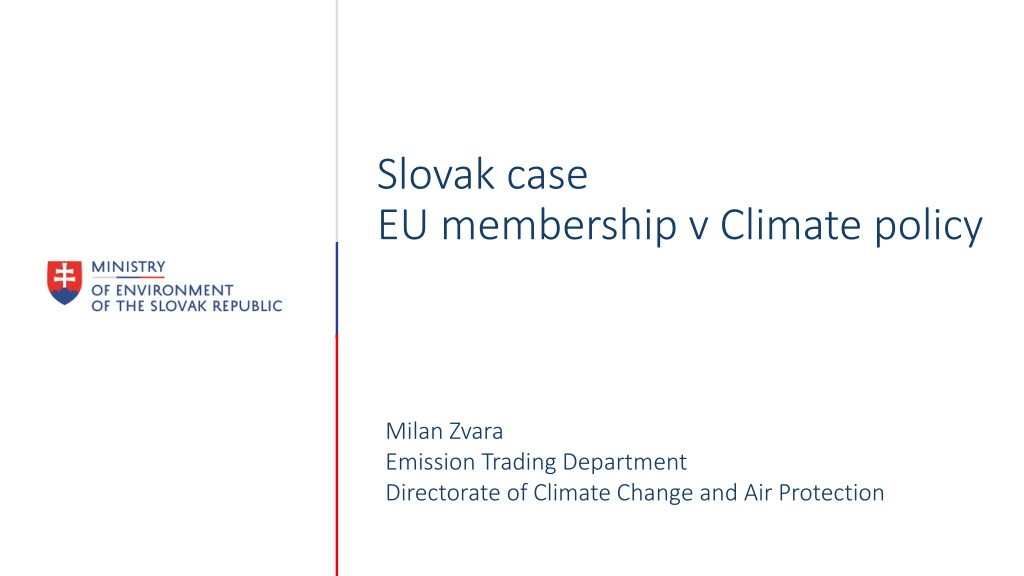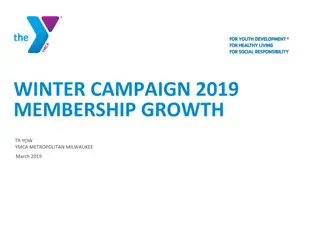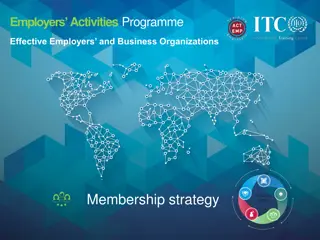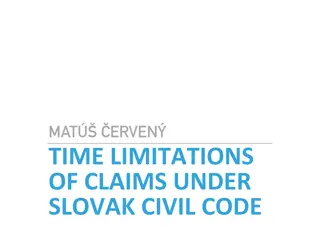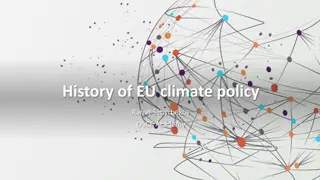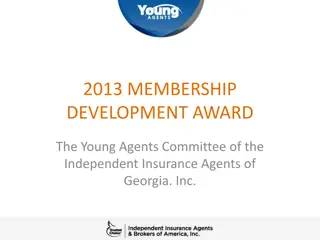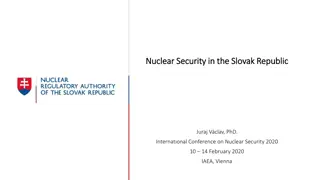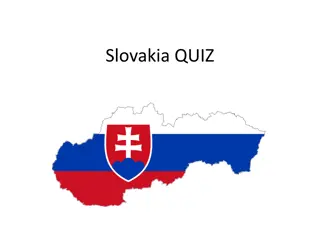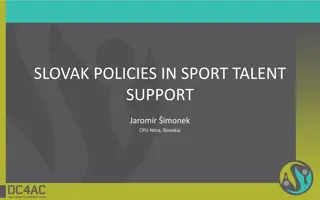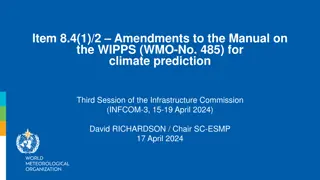Slovak case EU membership v Climate policy
Milan Zvara, the Director of the Directorate of Climate Change and Air Protection, plays a vital role in Slovakia's EU membership regarding climate policy. He oversees emission trading and contributes to environmental protection efforts. His leadership ensures compliance with EU regulations and promotes sustainable practices in Slovakia's approach to climate change mitigation.
Download Presentation

Please find below an Image/Link to download the presentation.
The content on the website is provided AS IS for your information and personal use only. It may not be sold, licensed, or shared on other websites without obtaining consent from the author.If you encounter any issues during the download, it is possible that the publisher has removed the file from their server.
You are allowed to download the files provided on this website for personal or commercial use, subject to the condition that they are used lawfully. All files are the property of their respective owners.
The content on the website is provided AS IS for your information and personal use only. It may not be sold, licensed, or shared on other websites without obtaining consent from the author.
E N D
Presentation Transcript
Slovak case EU membership v Climate policy Milan Zvara Emission Trading Department Directorate of Climate Change and Air Protection
2 Content Differences in some obligations for a country in the EU and outside of the EU The main advantages of the EU membership Past 20 years in Slovakia Details on ETS in Slovakia Details on sectors outside of the ETS in Slovakia Integrated National Energy and Climate Plan Low Carbon Development Strategy up to 2050 Latest developments- EU level 24. 2. 2025
Differences in some obligations for a country in the EU and outside of the EU 3 Reporting obligations Number of meetings abroad 24. 2. 2025
4 UNFCCC UNFCCC reporting reporting obligations obligations National Inventory Report Biennial reports National Communications 24. 2. 2025
5 EU EU reporting reporting obligations Annual report National Inventory Report Report on policies and measures and projections Report on national adaption actions Approximated greenhouse gas inventories Report on the use of auctioning revenue and project credits Report on financial and technology support provided to developing countries Biennial reports and National Communications Annual reporting about every type of fuel used and biofuels blended in the fuels Report of compensation for the Indirect costs of EU Emissions Trading System in favour of sectors or subsectors exposed to a risk of carbon leakage Numerous notification regarding any change to national allocation table (including aviation table) under ETS system and changes to international credit entitlement table Notification regarding any changes to international credit entitlement table obligations 24. 2. 2025
6 UNFCCC UNFCCC meetings meetings ( (annual annual) ) Intersessional in Bonn COP/MOP/MPA Various other regional/international meetings 24. 2. 2025
7 M Meetings eetings within membership membership ( (annual within the annual) ) the framework framework of of the the EU EU 4+2 Council of the Environmental Ministers 2 or more ECPG (Director Generals level) 10 WPIEI meetings (Head of Unit)+every day during the UNFCCC session 10 expert meetings (experts) 20-60 WPE meetings (climate attache based in Brussels+expert or HoU from capital) Bilaterals, conferences, forums, workshops ...for EU member states 24. 2. 2025
8 EU EU Presidency Presidency Chapter itself.... Because you are chairing and coordinating many if not almost all of those previous meetings 24. 2. 2025
9 Biggest Biggest advantage advantage of ( (climate climate change change area 1.Europeanisation 2. EU Climate law 3. EU budget of the the EU area) ) EU membership membership 24. 2. 2025
10 1. 1. Europeanisation Europeanisation Importance and urgency of the topic administration, business, young people Synergies- inter-sectoral approach and solutions Ambitions Green transition as part of the solution not only short sighted business interests Peer pressure of other MS Exchange of information, best practices 24. 2. 2025
11 Ambitions in Slovakia We committed to Climate Neutrality by 2050 in June 2019 Phase out our coal-fired electricity production by 2023 and stopping all coal mining operations by 2027 (the region of Upper Nitra). Already today 78% of our energy production is low carbon essential to preserve technological neutrality (cannot raise ambitions without preserving nuclear energy). With phase out it will be 90% carbon free electricity production Set national ETS target at the same level as the EU target (-43%) 24. 2. 2025
12 Ambitions in Slovakia We are ready to increase reduction commitments: from 40 to 45% EU emission reduction target by 2030 (by introduction of renewable sources and energy efficiency targets) and our national target from 12% to 20% decrease emissions from non-emission trading sectors. Recently (Sept. 2019) Slovakia made a decision to allocate additional 2.5 billion euro for climate investments by 2030. Internationally, Slovakia contributes to the Green Climate Fund (2 mil. USD this year). 24. 2. 2025
13 2. Climate Law 2. Climate Law- - Legal Only 1 Slovak law (Emission Trading Act) and countless European laws: ETS directive and aprx. 10 EU secondary acts regarding the ETS Effort Sharing Decision/Regulation LULUCF CO2 standards on cars, vans and heavy duty vehicles Energy law: Renewable Energy directive and Energy efficiency Directive, Energy performance standards of buildings Many energy efficiency and ecological standards Legal framework framework in Slovakia in Slovakia 24. 2. 2025
14 3. 3. Financing Financing CC 1. Modernization Fund (ETS)- 1,3 billion euro 2. Environmental fund (Slovak ETS- auction revenues)- 1,2 billion 3. EU budget (25% goes to CC)- from 6 to 9 billion euro up to 2027. ( estimated- from 2021 until 2050 Slovakia could receive from 25 to 38 billion euro from EU budget only ) 4. Other European funds- Switzerland and Norway 5. Innovation fund (ETS)- whole EU- 11 billion 6. Just Transition Mechanism- 100 billion euro for whole EU up to 2030 7. EIB will be transformed into Climate bank- 1 trillion euro for loans CC in Slovakia in Slovakia post 2020 post 2020 24. 2. 2025
15 Past 20 years in Slovakia Total GHG emissions were 43 316.45 Gg of CO2 eq. in 2017 (without LULUCF).This represents a reduction by 41% against the base year 1990. 24. 2. 2025
16 GHG Emissions by Sectors in 1990 and 2017 2017 1990 24. 2. 2025
17 Comparison of CO2 emissions per GDP (carbon intensity) Decrease of GHG emissions per capita: 1990 2017 24. 2. 2025
18 Backbone of EU/Slovak climate change mitigation EU ETS (ETS) Non- ETS (ESD/ESR) 24. 2. 2025
19 EU ETS Implementation in Slovakia Act No. 414/2012 on emissions allowance trading Several competent authorities (CA) with separate responsibilities: Ministry of Environment competent authorities with overall responsibility Environmental District Offices - regional CAs with EU ETS specific responsibilities 24. 2. 2025
20 Ministry of Environment is the central government authority responsible for allowance trading, performs primary state supervision of emissions trading matters, prepares the list of installations and notifies it the Commission, appoints the National Administrator (responsible for national account in the Registry), notifies the amount of free allocation for operators, submits reports to the Commission regarding emissions trading and the use of auctioning revenues, operates the emissions trading reporting system, aviation. 24. 2. 2025
21 Environmental District Offices A District Office is responsible for one district and has jurisdiction over installations that are established in their territory issue permits to emit greenhouse gases, approve of MPs, change in permits and notification of changes of the MPs, notify the Ministry of the issuing of permits, changes to permits and removal of an installation from the ETS, receive and review AERs and VRs, confirm the correctness of the data contained, carry out regional supervision of allowance trading within the district, impose fines for infringements, ETS inspections. 24. 2. 2025
22 Organisational chart of EU ETS implementation in Slovakia Competent Authorities Ministry of Environment Slovak National Accreditation Service Slovak Environmental District Offices Environmental Inspectorate Accreditation General inspections Application Inspections Free allocation Permit, MP AER + VR Aviation AER Operators Verifiers AER + VR MP = monitoring plans, AER = annual emission reports, VR = verification reports
23 Number of installations in 2018 = 115 National allocation table 2013 - 2020 Allocated emissions Verified emissions 16 466 336 2013 21 831 827 15 820619 2014 20 918 069 15 029 434 2015 21 181 216 14 526 743 2016 21 264 045 13 849 714 2017 22 063 225 13 658 304 2018 22 193 396 13 251 549 2019 March 2020 January 2021 2020 March 2021 Auction 100 % auction revenue is an income of the Environmental Fund- but not everything used for CC Increasing the energy efficiency of existing public buildings, including thermal insulation Compensation for indirect emission costs (passed on in electricity prices) 24. 2. 2025
24 Non- ETS sectors Up to 2020 Effort Sharing Decision (ESD) From 2021 Effort Sharing Regulation (ESR) 24. 2. 2025
25 ESD Effort Sharing Decision Sectors outside the EU ETS (households, small energy and industry, transport, waste and agriculture) National Non-ETS target: +13 % (comp. 2005) 2020 ESD target (% vs 2005) +13% 2015 ESD emissions (% vs 2005) -23.2% 2020 ESD projections WEM (% vs 2005) -23% 2020 ESD projections WAM (% vs 2005) -26% 24. 2. 2025
26 ESR from the Slovak perspective -30% EU target (compared to 2005), sectors outside the EU ETS (households, small energy and industry, transport, waste and agriculture) Target change from + 13% by 2020 to -12% by 2030 (compared to 2005), in 2019 we changed it to 20% Emission adjustment in 2021 in accordance with Article 10 (1). 2 - an increase of 2 160 210 AEA New flexibility with LULUCF - 1.2 mil. ton of CO2 eq. SK is not entitled to one-off flexibility with ETS Other flexibility: - Borrowing 10% (2021-2025), 5% of allowances (2026-2030) - Banking of surplus allowances to another year (2021-2029) - Transfer of 5% (2021-2025), 10% (2026-2029) of allowances between Member States 24. 2. 2025
27 Integrated National Energy and Climate Integrated National Energy and Climate Plan for 2021 for 2021 - - 2030 2030 Plan Governance for the Energy Union has stipulated this obligation 1stdraft December 2018 with national contributions for EE and RES targets (binding targets only EU level) Summer 2019- Commission has adopted its recommendations (Slovakia raise ambition for RES and EE) 11 December 2019 - Integrated National Energy and Climate Plan for the years 2021 to 2030 adopted by the government 24. 2. 2025
28 EU and national targets (from the plan) EU and national targets (from the plan) EU targets National targets at least - 40 % GHG reduction target (1990) at least - 40 % - 43 % - 43 % ETS target (as of 2005) - 30 % - 12 % (-20% ) Non-ETS target (as of 2005) 32 % 19,2% Renewable energy target 32,5 % 30,3 % Energy efficiency target 24. 2. 2025
29 Low Carbon Development Strategy up to 2050 Low Carbon Development Strategy up to 2050 Early Spring 2020- adoption of the Low Carbon Development Strategy up to 2050 Models show that with additional measures (more or less currently adopted national targets for RES and EE) will get us in 2050 only to - 70% or max. 80% reduction which means emission gap from 23 till 14 MtCO2ekv. Policy focus before 2030- renovation of the buildings, removal of the coal from the energy and industry sector, after 2030 electrification of transport and recuperation of the heat from industry Increase of electricity consumption and new nuclear powerplant 24. 2. 2025
30 Low Carbon Development Strategy up to 2050 Low Carbon Development Strategy up to 2050 24. 2. 2025
31 Low Carbon Low Carbon Strategy decarbonisation decarbonisation Strategy up to up to 2050 2050- - cost cost of of -70 to 80 % target will cost additional 8 billion euro (2031-2050) and 196 billion euro (2031-2050) compared to reference scenario (BAU). In other words it will be annual additional cost on the level of 1,8 % GDP up to 2040 and 4,2 % GDP up to 2050 Savings- 2 billions on fuels Households - additional 1 billion/annum before 2030 and 8 billions/annum in 2050 Higher GDP in the long term but lower household consumption, lower wages and higher unemployment 24. 2. 2025
32 Latest developments Latest developments- - EU level EU level December 12- European Council (European Summit) committed EU to reach climate neutrality by 2050 New Commission European Green Deal : Reduction target for the EU will go from -40% to -50% or -55% Changes in legislation such as Transport and buildings part of the EU ETS Carbon Border Tax for third countries according to carbon footprint of some products 24. 2. 2025
Thank you for your attention milan.zvara@enviro.gov.sk
